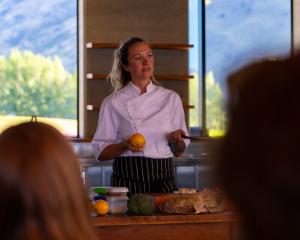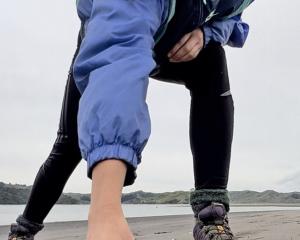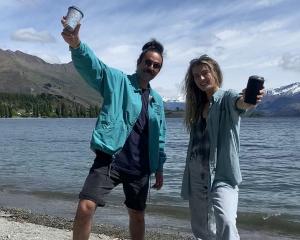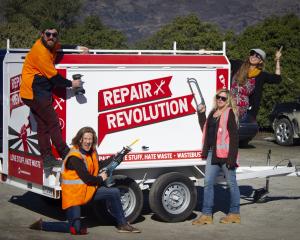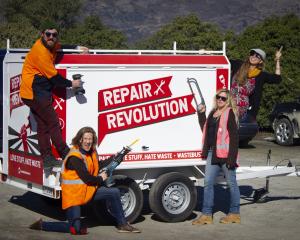
It's time to take the bubble wrap off our lives, writes Gina Dempster.

Why is it that I'm never quite ready for Plastic Free July? Trying to give up single-use plastic would be challenging in the middle of the summer but somehow doing it in the middle of winter makes it even harder. There's nothing in the garden, winter sports involve lots of packed lunches and all those dark, cold days make you want to eat more!
At least this year, I have more buddies doing it with me (most of whom seem to be doing it more successfully than me: feeling the pressure!). What started as a few people in West Australia in 2011, has ballooned into millions of participants in 150 countries. Outside of Plastic Free July, more and more people are changing their habits to reduce single-use plastic at home. Choosing to take your own coffee cup or shopping bag makes you pretty normal these days (in Wanaka at least).
I think it's because the damage plastic is doing to our oceans is getting harder and harder to ignore. You can't escape plastic pollution; on social media, in the news or at the beach. Whether it's a video of a turtle with a straw delicately being extracted from its nose, or stories about washing synthetic clothes releasing harmful plastic micro-fibres into the ocean, plastic is doing damage that we never saw coming. Water covers two-thirds of the planet, like a circulation system for the earth. The state of our seas and waterways is critical to the health of the planet.

Plastic Free July holds up a mirror so we can see how we use single-use plastics as individuals. Given the food distribution system we live in, we're extremely likely to fail at some point in our attempts to give up all single-use plastics for the month. But Plastic Free July is not about perfection, it's about giving it a go and learning which habits we can change. Bit by bit, our individual changes add up; in our own households and across the world. I love the 2010 satirical headline from The Onion (www.theonion.com): "`How Bad For The Environment Can Throwing Away One Plastic Bottle Be?' 30 Million People Wonder."
The most powerful thing about Plastic Free July is the way it's spreading. When workplaces are getting together to make beeswax wraps, you can bet plastic-wrap manufacturers are starting to think about the future viability of their product. In Wanaka last weekend, Wastebusters and Plastic Bag Free Wanaka ran a Waste Free Fair to swap tips and set people up with the knowledge and products they need to avoid single-use plastic. You could hardly move from one side of the room to the other, and the most powerful part was the conversations people were having with each other about what they were doing at home to avoid waste, especially plastic.
A big shift is happening right now, with people waking up to the fact that there is no such place as "away". When we throw our waste "away", it goes into our land, potentially pollutes our water and the impact lasts for longer than the generations we can imagine into the future. The shift that is happening now is that we are taking responsibility for our waste as individuals. The next challenge is for businesses and governments to step up and match (or improve on) what's happening on the individual level.
I've been reading a copy of How to Give Up Plastic, by Will McCallum, Greenpeace UK's head of oceans campaigner. He gives tips on how to reduce plastic use at home, but he's also very clear that individuals alone will never get on top of plastic pollution. We need collective action and a rethink of how we create and deal with waste.
"... despite the best of intentions, it is nigh on impossible to give up on plastic altogether and to not be complicit in how much is out there. Although it's clear there is so much people can do as individuals to make a change, it's also clear that producers of plastic packaging are making far too much of it, with no plan for what to do after it is used once. Politicians simply aren't going far enough in making producers take responsibility ... to place the full responsibility on individuals to deal with it cannot be fair."
- From How to Give Up Plastic, by Will McCallum, published by Penguin.
If you have given up one single-use plastic item for July, such as take-away coffee cups or plastic shopping bags, then you're a star, because changing a habit is never easy. If you're trying to give up all single-use plastic, then you're a hero, even if you fail. But the challenge for anyone interested in reducing waste at home is to help give the message to businesses, local council and government that it's time for them to step up too. Plastic pollution is a massive problem and the real impact will come when we tackle it collectively, as well as on an individual level.
 Flesh-footed Shearwater from Lord Howe Island in Australia with pieces of plastic found in it's stomach. Photo: Silke Stuckenbrock/TwoHandsProject.org
Flesh-footed Shearwater from Lord Howe Island in Australia with pieces of plastic found in it's stomach. Photo: Silke Stuckenbrock/TwoHandsProject.org

Numbers tell the story
• More than two-thirds of the planet is covered by water.
• A rubbish truck a minute of plastic waste goes into our oceans, and it could treble in the next 10 years.
• 90% of seabirds are likely to have plastic in the gut. A flesh-footed shearwater, from Lord Howe Island in Australia, is pictured above with pieces of plastic found in its stomach.
• We buy one million plastic bottles a minute.
• 38 million fragments of plastic were found on uninhabited Henderson Island, part of the Pitcairn group.
Get collective action on plastic pollution
Put your name to it
Sign the petition to bring back a 10c refund for recycling drink containers in New Zealand. A container deposit-refund scheme reduces plastic litter in waterways and encourages high-quality recycling.
our.actionstation.org.nz/petitions/recycling-makes-cents-we-want-cash-for-containers
Get political
Contact your MP about policies to encourage waste reduction, such as:
• increasing the waste levy
• introducing a container deposit-return scheme
• bringing in a levy or ban on plastic bags
Let them know
Give feedback to businesses about the packaging they use (good and bad), in person or on social media. Yes, they do listen!
Be entertained
For Plastic Free July holiday entertainment, try watching Blue Planet II.
David Attenborough's 2017 documentary on the state of our oceans combines stunning footage of the intimate lives of sea creatures with the changes to their environment caused by humans. If (like me) you missed the screening on TVNZ in November 2017, buy the DVD series, watch it with your family and then share it with friends and workmates.
Pack a "day bag"
We've all been there, caught short without our reusable cup or bag. Putting together a day bag can mean you're always prepared. Include a cup, food container, cutlery, produce bag, shopping bag and reusable straw (if you need one), and then keep it somewhere handy to grab every time you leave the house.
Trial 10c bottle refunds
Go out for a walk with your kids and give them the opportunity to collect pocket money by giving them 10 cents for every bottle or can they pick up. They'll quickly figure out why container deposit-refund systems are so effective in combatting litter (they also produce high quality recycling).
Swap homemade for prepacked and processed
With the break in routine with the school holidays, you might find time to experiment a bit. Processed food tends to be high in salt, sugar and packaging. By swapping out just one product you frequently buy, such as crackers or muesli, you'll throw out less rubbish, save money and eat healthy.
 Carolyn McFarland, from Plastic Bag Free Wanaka, makes beeswax wraps using the oven tray method. Photo: Anna van Riel
Make your own beeswax wraps (ironing method)
Carolyn McFarland, from Plastic Bag Free Wanaka, makes beeswax wraps using the oven tray method. Photo: Anna van Riel
Make your own beeswax wraps (ironing method)

Ingredients
(makes 4 beeswax wraps)
100g organic beeswax and 15g of coconut oil
Clean 100% cotton fabric.
New wide brush with natural bristles (good to share with others)
Two sheets of baking paper
Wooden chopping board
Old tea-towel
Pinking shears
Iron
Method

Add the coconut oil and mix gently
Cover the wooden chopping board with the old tea-towel and place a sheet of baking paper on top.
Cut a square of the cotton with pinking shears to size.
Brush the melted wax over the cotton, covering it to the edges but not too thickly
Place the other square of baking paper over the cotton
Iron the top of the baking paper so that the wax spreads and soaks into the cotton.
Hang the beeswax wrap up to dry by pegging it to a string line or put it on a drying rack.
Repeat to make more, using the same sheets of baking paper.
To clean up, wipe the iron with a hot, damp cloth and rinse pot out with boiling water.
Tips
You want just enough heat in the element to keep the wax melted. If it gets smoky, it's too hot.
The iron needs to be hot enough to spread the wax evenly under the baking paper.
Thinner fabric absorbs the wax best.
The brush gets pretty waxy, so best to keep it for the next session or lend it to friends.
It goes without saying that melted wax and irons are hot, so take care, especially with kids.
For an oven tray method, go to: plasticbagfreewanaka.org.nz/resources/
 The People's Bread, fresh from the oven and delivered in brown paper bags to your door. Photo: Ruth Heath
Plastic Free joy
The People's Bread, fresh from the oven and delivered in brown paper bags to your door. Photo: Ruth Heath
Plastic Free joy

These Plastic Free July lifesavers can also bring little moments of joy to life any time of the year.
Do Gooder Ecofloss
Compostable silk floss in a recycled glass tube inside a wee box made from recycled paper. When you run out, you can get a refill. The company, set up by Nelson dentists, donates a free toothbrush for each one sold, to organisations helping families in need. dogooder.co.nz/
The People's Bread
Delicious fresh-baked sourdough bread made from freshly-ground grain and delivered to your mailbox every week in brown paper bags.
Email: thepeoplesbread@gmail.com
Loose leaf tea
It may sound crazy but most tea-bags contain plastic! Loose leaf tea tastes better and the ritual of filling a teapot makes the cuppa more enjoyable.
Beeswax wraps
They smell good enough to eat, make school lunches so much easier and look pretty too. Sayonara plastic wrap.
- Gina Dempster is communications officer at Wanaka Wastebusters.
- Each week in this column, one of a panel of writers addresses issues of sustainability.



